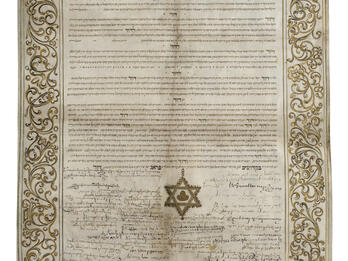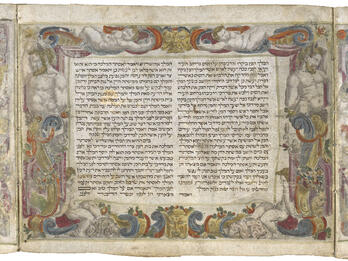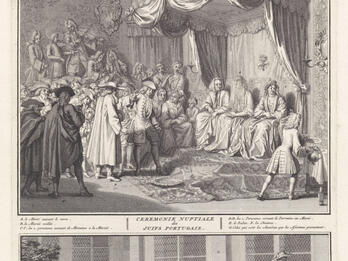Lev aryeh (Heart of a Lion)
The First Gate: Chapter One
The Benefit of Memory Is the Splendor of the Glory of Majesty, and Its Necessity for Every Man
In my opinion, there is no person in this world, whether he is a sage or a merchant or a craftsman, whose soul does not desire to have a powerful memory; for remembering affects everyday occurrences—it distances us from harm and brings us closer to benefit. All need it, every man according to the work he does.
However, this is especially true for all the scholars in the world, as they greatly yearn for it [i.e., remembering]. If he is an adjudicator or preacher, then he needs it like the bread that sustains him. For what benefit is a sharp, clear intellect and proper reason if one has to review his chapter a hundred times, in accordance with the saying of the Tanna: “One who learns quickly but quickly forgets” is like “a funnel that lets in at one end and out the other” [m. Avot 5.12, 15].
And have our sages of blessed memory not taught: “repeat and repeat, and you will not be in need of baladhur”?1 And there are people whose nature has weakened their memory, or the troubles of the times have oppressed them and weakened their faculties of remembering, to the point that they have to read something and go over it a second and a third time, and even four hundred times, like the certain student of R. Parida [b. Eruvin 54b], and they are not able to retain anything in their memories. And thus they toil uselessly and in vain.
A few came before us who were noted for their God-given gift of memory, like those among our sages of blessed memory who would learn three hundred laws, and three hundred questions, and three hundred answers, all orally [b. Ḥagigah 15b]. And among the nations, they said about Cyrus, the King of Persia, that he would know by name each and every one of the hundreds of thousands of mercenaries in his army. And Julius Caesar would arrange and dictate seven letters to seven scribes all at one time and all concerning different topics, and that he did not forget anything that he had thought of during his life, except the insults he received. Mithridates ruled over twenty-two nations with twenty-two languages, and would respond to everyone who came before him for judgment in his own language. Carneades would repeat by heart any book he had read only once, as if he were reading it from the original text. But how many others were like these men? They are an absolute minority relative to the rest of humanity, most of which forgets its own right hand. For example, there was a Roman who once forgot his own name.
If, beginning at the time of our holy rabbi, it was permitted to write down the Oral Torah, because it was a time to act for the Lord (Psalms 119:126) [see m. Berakhot 9:5], for they saw forgetfulness was increasing, then all the more so is this the case in these generations of ours, in which forgetfulness is continuously growing very, very strong, until the point that now it reigns over all.
The superiority of man over beast is only [see Ecclesiastes 3:19] through his memory, which positions things in his mind so that he can accept them if he so chooses. For without this, he labors in vain, in intellect and in speech, and all the virtues of learning and knowing, as well as the natural aptitude for practical action, are all in vain today. One is very much dependent upon memory in these matters.
And many times, I have imagined, and many times it has crossed my mind, that if a voice from heaven were to say to me, “Ask for something and I will grant it to you,” then I would only ask and seek to receive an immense memory from the Lord. For since now that all the sciences are written in books, a man who is neither wise nor stupid but who reads and remembers everything will arrive at a level that is seemingly close to that of Solomon.
How glorified today is the king of Israel (2 Samuel 6:20), the presiding judge of one country, if they ask him for righteous judgments and instruction concerning what is forbidden and permitted, or judgments concerning financial matters, or anything whatsoever, and he instantly expresses his opinion—without saying, “My crown is small for me, and I will give you my opinion by looking at the Shulḥan ‘arukh and the adjudicators, or those familiar with the discussions of Abaye and Rabba.” For if he is an expert in Jewish law, he can analyze the apparent contradictions between one law and another, and through such difficulties and their solutions, one case from another—or if in his wisdom he has studied sweet morsels of Torah—he will suddenly declare, “This authority says such-and-such, and that one says such-and-such.”
And needless to say, if an honest preacher remembered these things, and did not forget a verse, or a teaching, or a new interpretation, or an ethical principle, or a beautiful saying, any of which he had thought to articulate in his public sermon, for his heart is steadfast and he expresses himself eloquently—how pleasant would it be for his listeners and they would praise him at the city gates [see Proverbs 31:31]!
Notes
[Baladhur (“marking nut”) was thought to strengthen memory and used extensively throughout the medieval world to treat forgetfulness.—Trans.]
Credits
Published in: The Posen Library of Jewish Culture and Civilization, vol. 5.






